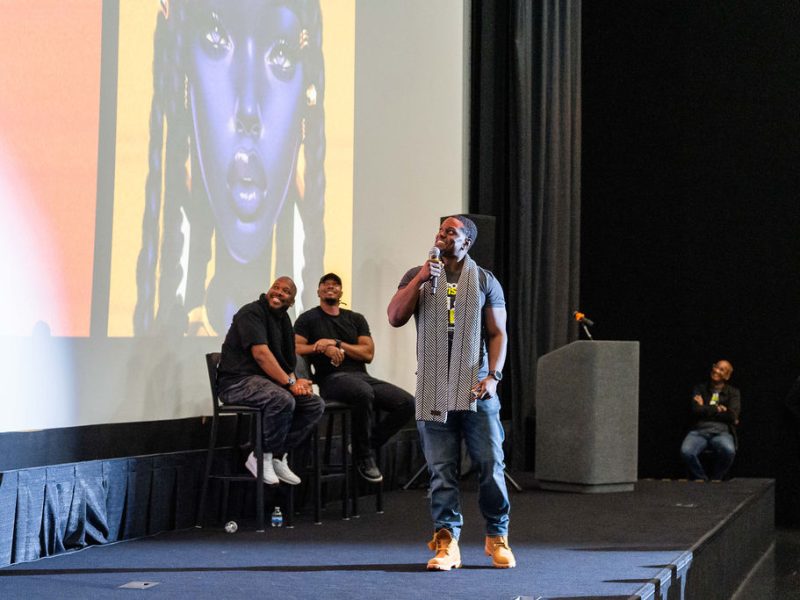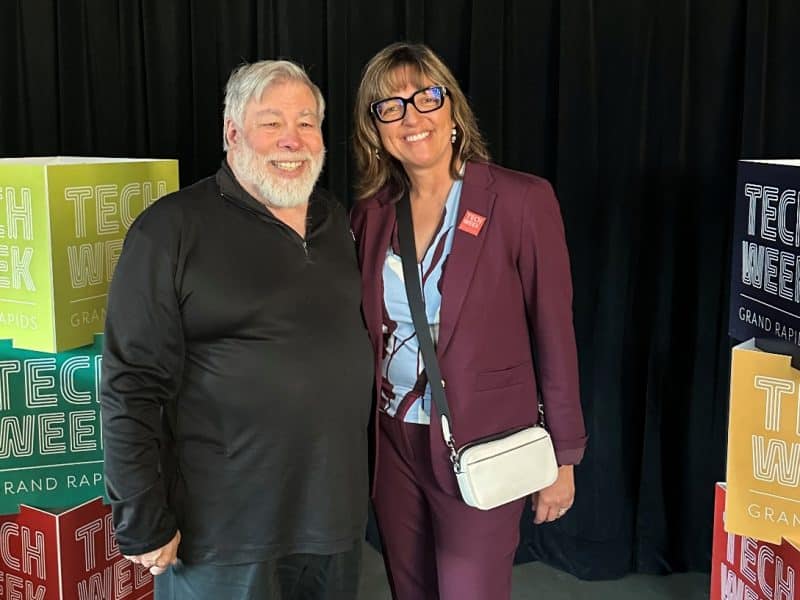Atomic Object plays under the big lights with new drug testing app
Grand Rapids’ own Atomic Object teamed up with Drug Free Sport to create a new iPad-based drug testing app that projects to launch into use with the NFL, NBA, NCAA and more. Steven Thomas Kent reports on how the local tech company is getting in the game on a national level.

A year and a half ago, just as team members at Atomic Object were poised to fly to Kansas City and pitch to the National Center for Drug Free Sport for a high-profile partnership, their plans got scuttled by our beloved Michigan winter weather.
Snowed in and unable to make their flight, Atomic CEO Carl Erickson and others re-grouped, jumped on a webinar and turned a potential disaster into a slam-dunk, according to Drug Free Sport COO Chris Guinty.
“They did a fantastic job,” Guinty says. “I remember they walked through their offices with the camera on their laptop and showed us their office in Grand Rapids, and they were introducing us to all their people as they went. And we just really hadn’t seen anyone do that before.”
“It was nothing they planned, but it was a unique sales pitch,” Guinty adds. “It was intriguing to us, so they really made the best of an awkward situation.”
18 months later, Atomic Object and Drug Free Sport are ready to unveil the fruits of their partnership. They’ve developed a new iPad-based drug testing technology called SCAN3, which will soon go into use among Drug Free Sport’s star-studded list of clients: The NFL, NBA, MLB, PGA tour, NCAA, and many of the other major sports leagues and associations in North America.

SCAN3 is the latest innovation from Kansas City-based Drug Free Sport (DFS), which pioneered the use of paperless technology in the sports drug-testing industry more than a decade ago.
While their first generation of digital testing used Palm technology and the second iteration used specially-designed handheld Honeywell devices, DFS decided they wanted to go with a more familiar technology for their third generation; something that young athletes would already feel familiar with and comfortable around, Guinty says.
“We wanted athlete buy-in and familiarity, and athletes are familiar with the iPad,” Guinty says. “It’s mostly young people who have grown up with this technology. We looked at Apple and said, ‘Well, here’s a company that’s not going anywhere, and we can replace the units easily at retail,’ and so on.”
Drug Free Sport linked up with a local consultant, Free State Consulting, which provided them with a list of potential developers who could help them tailor their drug testing systems for iOS: a couple of local vendors in Kansas City, one competitor based in San Francisco, and Atomic Object.
Despite the home-field advantage of the Kansas City-based firms, Guinty says, Atomic Object gradually won over Drug Free Sport with their client dedication, strong resume and that inventive webinar pitch.
“We’re a big believer to use local when possible, so Atomic Object had a challenge to overcome, pitching from out of state,” Guinty says. “But the group we looked at here in Kansas City was a conglomeration of independent contractors, and we knew our system was more complex and would require more attention than they understood.”
“Moving forward, I can’t talk enough about how right we were to select Atomic Object,” Guinty adds. “They have this ability to translate complex IT issues to non-IT, sports-minded staffers in our office, and that’s been a huge piece.”
Atomic Object’s work with Drug Free Sport has been headed by software developer Jason Porritt, who says that he and his team understood from the beginning that athlete user-friendliness was a paramount concern for DFS in their new generation of iPad-based drug tests.
They also added a number of new features and capabilities to the software, Porritt says, like the ability to scan barcodes from testing beakers and vials with the iPad’s camera for tracking purposes, and high-res signature capture through the iPad touch screen.
“They were really looking for something a little bit easier to use than before,” Porritt says. “Their previous systems had small screens and were a little bit more difficult to interact with — picture the kind of device someone from UPS might use when they drop off a package. A lot of what they’re doing [with this new version] is trying to reflect info back to the athletes as they walk them through this process.”
With Drug Free Sport’s wide range of clients, Porritt says that he and his team had to face a significant challenge: They needed to create a software platform that was easy to adapt and modify for all manner of different testing criteria.
Although all the major sports leagues in North America subject athletes to drug testing, they rarely agree when it comes to concentrations and classifications of drugs. A positive drug test in the NFL may come out negative in the NCAA, for example, because of different thresholds of blood concentration of the drug. And even within a league, those standards are ever-changing as players’ unions and leagues negotiate new policies from season to season.
Rather than try and create a separate app for each client, Porritt says, the software they came up with is easy to update and change — almost modular in design.
“Picture it like Legos,” Porritt says. “The NFL wants to collect some specific types of info, like the player’s position, and for a different client like the NCAA, they may want to record their academic year and so forth. So we wanted to build a more abstract kind of system of controls that we can re-configure and sort of re-mish-mash together for each of those different clients and their needs.”
Guinty also praised Porritt in particular for his ability to get out in front of clients and collections staff and demonstrate Atomic Object’s new software in the field.
Porritt says he’s flown down to Kansas City for several training sessions with clients and collections staff, which he says helped give him some perspective on how his team’s software looked in an athlete’s or collector’s hands.
“Just as an extension of building software, you end up writing documentation, showing people how it works and so forth,” Porritt says. “I kind of amped up that side of what I do on this project, and I’ve definitely enjoyed that part of it, because you really learn a lot about what you’ve built when you watch someone else pick it up for the first time.”
For his part, Guinty says he and his staff at DFS couldn’t be happier with the outcome of their partnership with Atomic Object. They plan to work with AO on future developments for their software, and regard them as practically the IT arm of their expansive drug testing business, he says.
“It almost feels, to us, like Atomic Object is an extension of Drug Free Sport,” Guinty says. “It almost feels like we have an office in Grand Rapids now, and that’s the biggest accolade I can give.”
Even though their work with Drug Free Sport figures to raise Atomic Object’s national profile as an accomplished iOS developer, Porritt says he and his team won’t spend too much time congratulating themselves. He says he and other developers at AO prefer to stay restless and avoid dwelling on past achievements.
“We like to say that we’re only as good as our last project,” Porritt says. “We really try to knock it out of the park no matter who we’re working with, and we like to be able to tell those success stories, whether it’s a Fortune 500 company or a small startup.”
Steven Thomas Kent is the editor at Roadbelly magazine and a high-tech, high-growth features writer at Rapid Growth Media. Stalk him on Twitter @steventkent or e-mail him at steven.t.kent@gmail.com for story tips and feedback.
Photography by Adam Bird








